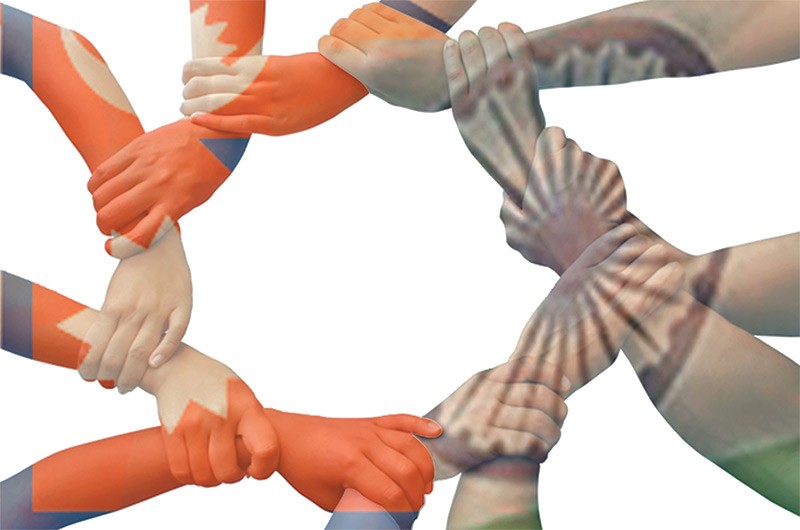In an era marked by divisions and disparities, the Bahá’í teachings present a profound paradigm shift: the transition from dependence to interdependence. This transformative journey emphasizes the importance of collaboration and unity in the pursuit of a shared future, wherein every individual contributes to and benefits from the collective well-being. The essence of this transition can be encapsulated in the metaphor of a flourishing garden, wherein the interwoven roots of diverse plants sustain each other, culminating in a vibrant ecosystem.
The concept of dependence often cultivates a mindset that views relationships as transactions isolated from a broader context. Individuals may become ensnared in a web of self-interest, fostering competition over collaboration. In contrast, interdependence beckons humanity towards a collective consciousness, highlighting the interconnectedness of all beings. As petals unfurl toward the sun, so too must societies aspire to illuminate their shared humanity through principled action and mutual support.
At the heart of the Bahá’í teachings lies the recognition that humanity constitutes a singular organism. This intrinsic unity transcends geographical, cultural, and social boundaries. The metaphorical garden blooms not only through individual aspirations but through the symbiotic relationships cultivated among its inhabitants. Each individual is not merely a solitary plant but an integral component of a larger ecological tapestry, with each thread enriching the whole.
One significant teaching of the Bahá’í Faith is the notion of the equality of men and women. This principle underscores that the advancement of one gender cannot occur in isolation from the other. Just as a garden flourishes more robustly with a diversity of flora, societies thrive when both men and women contribute equally. The mutual reinforcement of diverse perspectives nurtures growth and innovation, urging communities to transcend outdated paradigms that tether individuals to rigid roles based on gender.
The principle of justice in Bahá’í teachings further accentuates the notion of interdependence. Justice serves as the foundation upon which a harmonious society is built, akin to fertile soil that nourishes the roots of a thriving garden. When justice prevails, the social fabric is strengthened, encouraging individuals to stand collectively against injustice and inequality. In this context, interdependence assures that the pursuit of justice is not a solitary endeavor but a shared responsibility, wherein each voice contributes to the symphony of change.
Moreover, Bahá’í teachings advocate for the elimination of all forms of prejudice, whether rooted in race, ethnicity, or religion. Prejudice is an impediment to the flourishing of interdependence; it casts shadows upon the garden, stunting growth and fostering division. The establishment of harmonious relationships among diverse communities is vital for creating a future where mutual respect and understanding guide interactions. Thus, spirituality offers a transformative instrument to uproot prejudice, cultivating empathy and compassion instead.
Concurrently, education is heralded as a pivotal mechanism within this transition. Knowledge acts as the sunlight illuminating the garden, awakening potential in every individual. Universal access to education ensures that every person possesses the tools necessary to contribute meaningfully to society. In this regard, education becomes the nurturing rain, allowing the seeds of talent to blossom into vibrant expressions of truth and creativity. A populace well-equipped with knowledge is better positioned to collaborate in the pursuit of common goals, enhancing the substance of interdependence.
The economy, too, requires a reimagining through the lens of interdependence. The Bahá’í teachings highlight the need for an economic system that prioritizes the welfare of the community over individual gain. This principle aligns with the metaphor of the garden, wherein each plant participates in a co-dependent relationship with the ecosystem. When economic systems foster collaboration, equitable distribution and sustainable practices emerge, ensuring that no one is left behind. The flourishing of the garden is contingent upon careful stewardship, balancing individual needs with collective prosperity.
Furthermore, the concept of global citizenship embodies the essence of interdependence. It calls upon individuals to transcend nationalistic barriers, envisioning a world where the well-being of each person affects the whole. This perspective amplifies the harmony of diverse voices, uniting humanity in its quest for peace and justice. As individual plants contribute their unique attributes to the garden, so too do global citizens enrich humanity with their varied experiences and insights.
Nevertheless, the transition from dependence to interdependence is neither instantaneous nor effortless. It requires a commitment to introspection and a willingness to transcend egoistic inclinations. This path necessitates the cultivation of virtues such as patience, forgiveness, and humility—qualities that are essential for nurturing genuine relationships within the garden of humanity. Each interaction contributes to the overall health of the ecosystem, steering individuals towards a higher purpose.
In conclusion, the Bahá’í teachings offer a transformative vision for a future defined by interdependence. By embracing the fundamental principles of equality, justice, and global citizenship, individuals can contribute to the emergence of a new social order, akin to a garden brimming with life and diversity. The beauty of this shared future lies in the acknowledgment that each person, like every plant, possesses a unique role to play in nurturing the collective. As humanity transitions from dependence to interdependence, it must awaken to the truth that in unity there is strength, and in collaboration, there is hope for a brighter, shared destiny.
